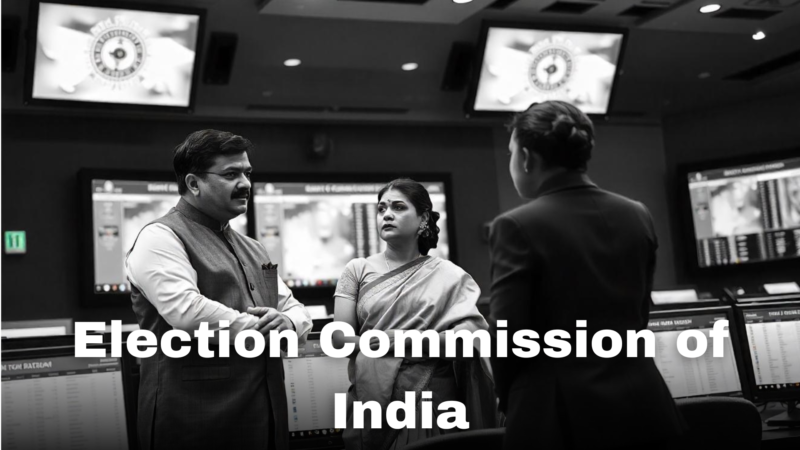Election Commission of India

Election Commission of India
The Election Commission of India, as the pillar of democracy
The ECI, as it is known by its initials, has remained a body authorized by the Constitution and is an essential part of the democratic fabric of the country. Established on January 25, 1950, the Commission is ravishing with the job of acting, processing, and holding free and fair elections at the national and state level. Being the largest democracy in the world: The polls in India are grand in scale-throughout India; over 900 million voters are eligible. Thus, the task of ECI is most challenging and vital.
Evolution and Mandate
The Commission was originally a single-member authority, but this changed in 1993 when it became a multi-member authority with the addition of two more Election Commissioners-a change that allowed for better oversight and execution of its functions. Thus, even though the Chief Election Commissioner is to head it armed with the Election Commissioners, appointments of all of them in India are done by the President.
Some of the operational mandates of the Commission include:
- Supervising Elections: The Commission shall see to it that elections are held in a free manner for the Parliament, State Legislatures, and the offices of President and Vice President of India.
- Model Code of Conduct: Implementation of the Model Code of Conduct to ensure political parties and candidates adhere to certain ethical standards during elections.
- Voter Awareness & Registration: Voter education and conducting campaigns through which increased voter turnout can be achieved, and providing up-to-date electoral rolls to achieve transparent and inclusive elections.
- Dispute Resolution: Following an inquiry, handle election malpractices, fraud, and disobedience to the electoral code of conduct.
- Use Technology: Technological innovations include Electronic Voting Machines (EVMs) and Voter Verifiable Paper Audit Trails (VVPATs) to enhance transparency and ensure efficiency throughout the voting process.
Highlights of Achievements
- The Introduction of Electronic Voting Machines: The introduction of electronic voting machines in elections made the ECI a pathbreaking achievement. EVMs are used in select constituencies starting from the 1998 elections. The all-pervasive introduction of EVMs has led to the elimination of the chances of invalid votes and manual counting errors.
- VVPAT: In 2013, along with the EVMs, the Voter Verified Paper Audit Trail (VVPAT) system has been introduced to ensure further electoral transparency, allowing voters to verify their votes on paper after casting their votes electronically.
- Enhanced Electoral Literacy: The ECI undertook the necessary initiatives through the Systematic Voters’ Education and Electoral Participation (SVEEP) program, involving young voters and marginalized groups significant in raising awareness and ensuring that every citizen did exercise his or her voting rights.
- Remote Voting Initiatives: The Election Commission is working on the possibility of remote voting for better chances of voter participation in consideration of the movement of the workforce and citizens settled abroad.
- Facilitating Special Provisions for Vulnerable Groups: The Election Commission has constantly been striving for inclusive elections by allowing special provisions concerning the voting rights of differently-abled voters, senior citizens, and voters who live in difficult terrain.
The Coming Challenges
In its role as steward of free and fair elections, the Election Commission has faced myriad challenges, such as:
-Malpractice in Elections: Though strict measures exist, electoral frauds like bribing voters, coercion, and blatant muscular power threaten to subvert the electoral process.
-Embattled Neutrality: The Commission must ensure its independence and that any actions which can be construed as politically not neutral are diligently avoided; the dependability of the electorate on the Commission is predicated on this core axiom.
-Tackling Fake News and Misinformation: The rapid-fire spread of misinformation on social media in the digital age poses a possible threat to the election outcome. The ECI is working together with social media platforms and other agencies to work on combating this menace; however, the huge volume of the problem is alarming.
The ECI envisages overcoming such hurdles with a future strategic plan featuring more aggressive digital outreach to voters and striving for transparency at every stage of the electoral process. The feasible-scale experimentation of a blockchain-based voting process is perhaps the juncture where the next breakthrough could lie-by allowing secure voting from remote locations.
In a nutshell
The Election Commission of India, acting as a covert steering wheel for democracy, allows every citizen the privilege to vote in a sense of universal fairness through transparency and efficiency. The challenge of continuous innovation in measures to adopt to address continuous challenges and build the knowledge of higher values of ethics permits the Election Commission of India to strive and fulfill its great duty of sustaining the very democratic ideals that support India’s growth.
Further, with the growth of the nation, the Election Commission is growing evermore committed to maintaining the sanctity of the democratic process in the most populous and – in its multiplicity of forms – diverse democracy on earth.
Important Link
- How did Kris Kristofferson die
- How to sign in bank of America online
- Millie Bobby Brown and Jake Bongiovi: A Love Story for the Ages
- India Women vs South Africa Women Cricket Match 2024
- Is Iran attacking Israel
- What happened to John Amos
- How many leagues are there in sports
- What are sports leagues
- How many times India beat Bangladesh?
Disclaimer: chronobazaar.com is created only for the purpose of education and knowledge. For any queries, disclaimer is requested to kindly contact us. We assure you we will do our best. We do not support piracy. If in any way it violates the law or there is any problem, please mail us on chronobazaar2.0@gmail.com
